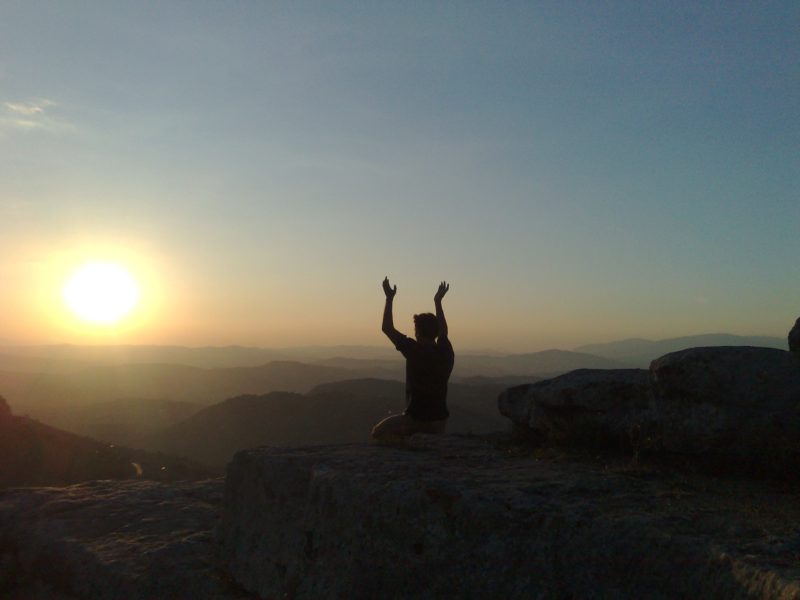
By Rick Waite
Two double vodkas on the rocks every night before dinner. To relax after a hard day at the office, I told myself. And then perhaps a glass of red wine with my meal. The burn in my throat turned into a dull buzz in my head and then I was numb. Self-medicating the anxiety, stress and anger away. It never interfered with my work. If I was in trial or had a big hearing the next day I never drank. But the rest of the time … Then, one day, I was done. What happened? I resumed my meditation practice after a break of 39 years.
I started meditating during my freshman year at Harvard in 1971. Maharishi Mahesh Yogi, guru to the Beatles, had turned the world on to Transcendental Meditation (TM). I received my mantra and began my meditation practice but I was overwhelmed by events during my freshman year and my meditation practice fell away in short order.
In 2010 I decided I needed to do something to cope with the stress of my law practice and my life generally. I heard that if you had ever received TM training you could go back for a refresher course. No charge. I called the Encinitas Transcendental Meditation center and asked if that was correct. The woman on the phone confirmed this.
“What’s your name?” she asked.
I told her.
She checked her database. “I’m sorry. I don’t see your name. Where and when did you receive your training?”
“Cambridge, Massachusetts. 1971,” I replied.
“Oh,” she said with a laugh. “Our records don’t go back that far. You can join us.”
I went to the TM training and committed that I would do it right this time. The TM way. Twenty minutes in the morning.
Twenty minutes in the afternoon. A couple of months after I started meditating every day I was halfway through dinner one night when I realized that I hadn’t had a drink. And I had no desire for one. That’s odd, I thought. The second day — same thing. No desire to drink. Maybe I’ll stop drinking for a week, I thought. The third day I decided I was done drinking. Forever. I poured the remains of my half gallon of vodka down the drain. The date: Sept. 8, 2010. I haven’t had a drink since. No 12-step program (of which I am a big fan). No cravings. No withdrawal. I just stopped. I am no scientist. But it seems to me that there is some correlation between my starting to meditate again and my decision to stop drinking. What do you think?
The benefits of meditation are now well known. In 1968 the Maharishi approached Harvard Medical School and asked that it research the benefits of TM. He claimed that the practice reduced blood pressure. The response was initially no but the Maharishi persisted. When he agreed to accept the outcome, whatever it might be, Dr. Herbert Benson, a cardiologist at Harvard Medical School, agreed to study the effects of meditation.
The Maharishi was right. Dr. Benson’s research demonstrated that meditation induces a state of deep relaxation which engages the parasympathetic nervous system by releasing chemicals in the brain that reduce blood pressure, metabolism, breathing and heart rate, and increase blood flow to the brain. Dr. Benson determined that 60 percent of all visits to healthcare providers are related to stress, which cause or exacerbate a number of medical conditions. His research showed that meditation can help with health problems associated with chronic stress such as fibromyalgia, gastrointestinal ailments, insomnia, hypertension, anxiety, headaches and chronic back pain. Dr. Benson published his research in the hugely influential book, The Relaxation Response. Dr. Benson’s research has been replicated by many other studies since its publication in 1975.
In his new book Tools of Titans: The Tactics, Routines and Habits of Billionaires, Icons and World Class Performers, Tim Ferris recounts when the Dalai Lama was asked how long it takes to have a life changing experience after starting a meditation practice. “About 50 hours,” he said.
That’s about how long it took me to have my epiphany and stop drinking after I established my daily meditation practice. Ferris also states that of all the world class performers he interviewed for his book, 80 percent meditate. If meditation works for 80 percent of billionaires, icons, world class performers and the Dalai Lama, it might work for you. If you are interested in starting a meditation practice contact me and I will help you. Pro bono. Good luck.
Rick Waite (rwaite@keenlaw.com) is an attorney with Keeney Waite & Stevens.
This article was originally published in the May/June 2017 issue of San Diego Lawyer.